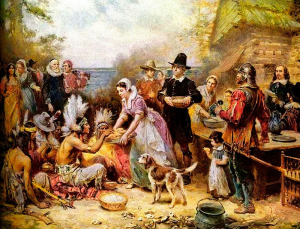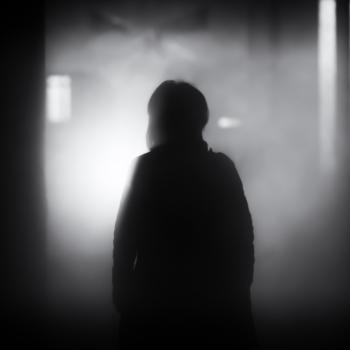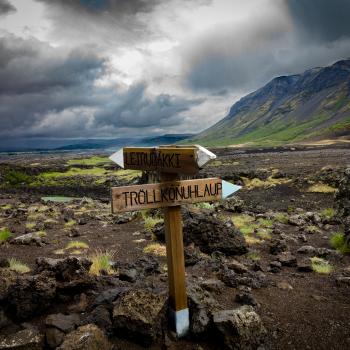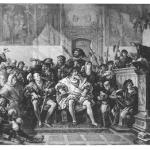 “Good Letters” is pleased today to welcome D.L. Mayfield to our team of bloggers.
“Good Letters” is pleased today to welcome D.L. Mayfield to our team of bloggers.
“That day we cook the big chicken” is what one of our neighbors called Thanksgiving, which seemed entirely appropriate to me. That year my husband and I invited all of our neighbors—refugees mostly from Bhutan and Somalia—to the community center of our low-income apartment complex to experience a traditional American holiday meal.
It was not going well.
People had filed into the community room, sitting at folding tables. We’d asked a few friends and family members to help us cook, and striving to be culturally appropriate, my husband and I dished up the plates and served them to the guests starting with the most distinguished (older, male) and ending with the children.
I began to notice the tentative interactions with the food: people were squinting, poking with their forks, shifting uncomfortably in their chairs. People (my friends) were taking one or two bites and then unceremoniously dumping the rest into the trash. I watched, horrified, as the food I cooked was wasted, right in front of my eyes.
I thought of the dozens and dozens of meals I’d eaten in their apartments. Much of it had been delicious, to be sure, a privilege and an honor. But some of the meals…the goat liver and the weird, fatty, gelatinous cubes, the undercooked beans topped with canola oil and a heaping teaspoon of sugar…. There were more than a few that I’d had to pray my way through, begging for the grace to keep swallowing, keep smiling, to do my duty as a good guest.
And here, in trying to repay the favor, I was being dismissed. Not only that, but my dream of recreating the (admittedly whitewashed and rosy-colored) image of the mythological first Thanksgiving—two cultures, coming together to sit and eat—was not going well.
Our neighbors from East Africa sat at one table; our neighbors from Southeast Asia sat at another. People stuck tight to their groups, occasionally whispering to each other. I circulated, desperately, trying to make introductions and whip up some pleasing chitchat. But both sides only wanted to tell me grievances they had against the people at the next table over; I could feel the tensions rising.
I explained away problems and chided the guests to be nicer to one another, scolding the little boys who were running wild through the room and knocking over chairs. The volunteers we had conscripted stood limply at the counter, ready to dish out seconds to people who clearly were not at all impressed with the food.
I looked at the scene: a rapidly decomposing tableaux of good intentions and the reality of complex relationships. The uneaten food, the arms folded across chests, the general sense of separateness. It was not a glowing picture of hospitality, commonality, of celebration.
It was what it was—an awkward getting together of people who all, in one way or another, had experienced more than their fair share of broken relationships.
I was only just starting to realize how broken I was relationally. I’d spent many countless hours trying to force community. I’d been determined, time and time again, to reach out—but only on my terms. I expected participation, reciprocation, and—if I am being honest—a miracle or two from the good Lord above.
But there was none in sight. Near tears, I finally decided it was time to serve pie. Everyone, especially the children, finally agreed on this point: sugar was good. As people ate their pumpkin pie with whipped cream on tiny paper plates, I reconsidered why I had thought it was a good idea to put together this event.
My neighbors began to get up, one by one, to leave. As they did so they came over and shook my hand, to say thank you. I watched them all walk out the door with a mixture of regret and confusion, wondering how it had all wandered so far away from my benevolent plans.
I did not think about what it means to ask people to leave their places of safety and security, to come to a bare community center and sit next to people they didn’t know very well and to eat foods they had never tried. I didn’t understand how I was asking my friends and neighbors to risk in ways that I would not have to.
I did not ask them to contribute, to bring the foods that brought them so much joy and pleasure and a sense of stability in a world broken apart by war and geography. I was unable to perceive how concerned I was with being the amazing hostess, the bringer of goodwill, of celebrating a holiday that had cultural meaning only for me.
I did not think about the needs of my neighbors, because it turns out I was only using them for my own satisfaction.
My memory of the event now has the sense of true, gritty community about it: community that is formed when there are places for people to repent, and places for people to be forgiven. Where there is room for us all, to eat or not to eat. Despite everything, my friends and neighbors had come—because they cared about me.
Later, some neighbors told me privately how much they hated the turkey I cooked. They were astonished that anyone would want to eat something so dry and tasteless, but their request, when the next Thanksgiving rolled around, I signed them up for a holiday food box from a church.
They took the large turkey that came with it, and hacked it into a thousand pieces with a giant cleaver—bones, innards, and all. And then they dumped it into a giant pot and made the most delicious turkey curry I have ever had, served in their apartment, eaten on the tin plates they used, with plenty of rice and spicy chutney to accompany it.
It was the perfect Thanksgiving meal.
D.L. Mayfield lives and writes in the Midwest, where she currently is a part of a Christian order among the poor. Mayfield’s writing has appeared in McSweeney’s, Image, Christianity Today, Books and Culture, and The Other Journal. Her book of essays is forthcoming from HarperOne in 2016. She blogs here and can be found on twitter here.















